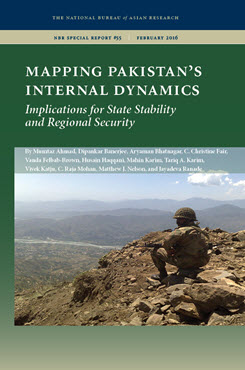Pakistan's Complex Security Dynamics
Conclusions and Outlook
This is the conclusion of the report “Mapping Pakistan’s Internal Dynamics: Implications for State Stability and Regional Security
Note: The following are excerpts from the conclusion. Download the PDF to read the full conclusion.
Among the multiple and contradictory tendencies highlighted by the essays in this NBR Special Report, it is difficult to discern an overarching trend in Pakistani society and polity. There are broad, though weak, currents of democratization flowing through the country; civil society groups, sections of the media, artists, and academics are demanding greater freedom of expression to examine the very foundations of state ideology and core beliefs. At the same time, strong religious sentiments, challenging and modifying the nature of Pakistan’s traditional Islamic persuasion, are animating national discourse. Consequently, intolerance of minority Islamic sects and of other religions is rising and leading to extremist thought and violence. The forces of social conservatism are at odds with the advocates of a liberal Pakistan. It is within the matrix of these pressures that the state is seeking to balance its moorings while battling the insurgencies arising from entrenched ethnic separatism, such as in Baluchistan, and religiously inspired rebellion, such as in the Federally Administered Tribal Areas (FATA).
Outlook
Pakistan is a deeply troubled state, but it is not a failing state. It is a country with immense possibilities, but to realize this potential it will need to abandon enmity toward India and seek to construct a modern progressive state. Pakistan’s India policy has held the country hostage, leading the military and political establishment to neglect the nation’s development agenda and turn to ever-greater religiosity to gain legitimacy and credibility. This approach has, in turn, given extremist religious groups a free hand within the country while the state uses them to secure its foreign policy objectives. Some of these groups, such as the TTP, have subsequently turned against the state, undermining domestic security and adversely affecting Pakistan’s social and economic well-being.
Pakistan’s traditional Islamic orientation, historically moderate in nature, need not prevent the country from becoming a prosperous state. However, its political and, more importantly, military leadership must change course radically as extremist theologies spread throughout the country. That even the shock of the Peshawar school attack has not led to any thought of reducing the social role of these extremist groups is a cause for pessimism.
The prospects of turning South Asia into a harmonious and prosperous region largely depend on Pakistani approaches. So long as Pakistan remains a prisoner of its current ideological moorings and militaristic policies for protecting its security, a change is unlikely. This is a pity for a country and people with so much potential.
Vivek Katju is the former Secretary (West) of India’s Ministry of External Affairs. He also served as Ambassador to Afghanistan, Myanmar, and Thailand.


